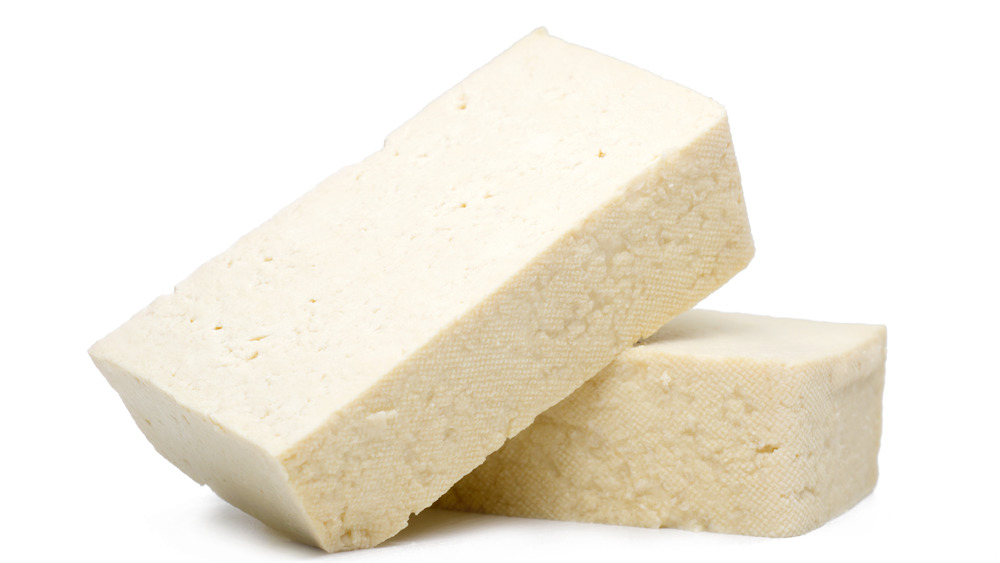What Happens To Your Body When You Eat Tofu Everyday
Tofu may have been around for thousands of years, but it only started to take off in this country back in the hippie days (via History) when it became a bland, squishy stand-in for meat. (That was before they knew how to put the texture in textured vegetable protein.) No-one was quick to label to-foods as "impossible" anything, since there was no way you were ever going to mistake tofu for the real thing. When tofu stops masquerading and instead acts as its own authentic self, as it does in dishes such as ma po tofu, this soy substance deservedly has its fans.
As to whether it's actually as healthy as tofu adherents claim, however, nutritionists have mixed feelings. In order to get as much input as possible into tofu's pros and cons, we asked three different experts to weigh in on what would happen to your body if you were to eat tofu every day. Jamie Hickey, NASM, FMS certified trainer, and ISSA certified nutritionist, is the founder of Truism Fitness, while Elizabeth Klingbeil, PhD RDN, is an assistant professor of Nutrition at Johnson and Wales University in Rhode Island and Piper Gibson, AHND, TND, BCDNM, FDN-P, is a holistic health and nutrition expert who offers her services to clients both in-person and via her website, Regenerating Health. Each one of these specialists gave us a slightly different take on tofu's pros and cons.
Tofu should be safe if consumed in moderation
Hickey sees both the good and the bad in tofu. He says it is a great source of protein, particularly if you are vegan and thus have limited options. Hickey also cites the fact that "tofu is packed with vitamins and minerals," and says "considering that most people have vitamin deficiencies tofu should become more of a staple in our diets." He also speaks of the isoflavones the food contains, saying these "have been proven to have estrogen antagonist properties that help reduce the risk of cancer, heart disease and hypertension."
So far, so good, but Hickey also admits that "too much of anything can be bad for you," and in the case of tofu, "too much soy can cause hormonal imbalance in women since it can make estrogen production become irregular [and] ovarian function can also be compromised." He also explains that tofu contains protein inhibitors that must be broken down before its protein can be absorbed, warning that this process "may lead to bloating, cramps, and gas pains," and also makes mention of the fact that "an excess of soy can also cause your body to not be able to use iodine efficiently" which is something that could lead to thyroid issues. While Hickey doesn't suggest giving up tofu altogether, he does recommend limiting your consumption, citing 50 milligrams of soy isoflavones per day as something that should be a safe amount.
More research is still needed into soy safety
Klingbeil agrees that tofu is "a great source of complete protein" since it "contains all of the essential amino acids needed in our diet." She says that eating tofu on a regular basis not only "ensures you are getting adequate protein ," but may also "be a great way to reduce excessive intake of saturated fats and cholesterol since animal proteins have higher amounts of [these]." Klingnbeil even indicates that, because of the high level of unsaturated fat found in tofu, "consistent intake may decrease levels of 'bad' LDL cholesterol in the blood, potentially lowering your risk of cardiovascular disease and other related conditions."
Just like Hickey, however, Klingbeil also sees a potentially significant downside to eating tofu. She cautions that "excessive soy intake may lead to increased risks of certain types of cancer," and also says that "increased tofu, or soy, intake has the potential to impact bone health, menopause, weight loss and even the development of diabetes." She does clarify, however, that "most of these claims are new," so she feels that "further research is needed to determine effectiveness."
Eating the same thing every day may not be the best idea
Gibson really isn't a fan of eating tofu — or any one thing — every single day, since she feels that "eating the same thing on repeat day in and day out may lead you to miss crucial nutrients from other foods." She has a few warnings about tofu in particular, characterizing it as "one of the most genetically modified foods (GMOs) in the world" and citing the fact that numerous studies (including this one from Nutritional Perspectives: Journal of the Council on Nutritionvia shared by EBSCO) indicate that "GMOs poorly impact our gut flora and microbiome." She says that "tofu can be challenging to digest," and explains that this "can lead to digestive side effects such as gas, bloating, and digestive distress." What's more, soy products, including tofu, contain "isoflavones that mimic estrogen and can lead to weight gain and hormone dysregulation in men and women."
If you're stuck on tofu, Gibson recommends that you consider eating only the organic kind. She also says it shouldn't be eaten on a daily basis, period. Instead, she advises "limit [tofu consumption] to a couple of times per week."



